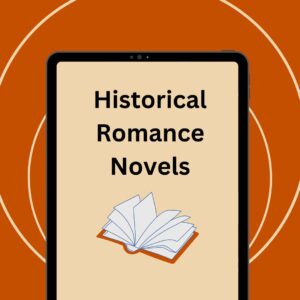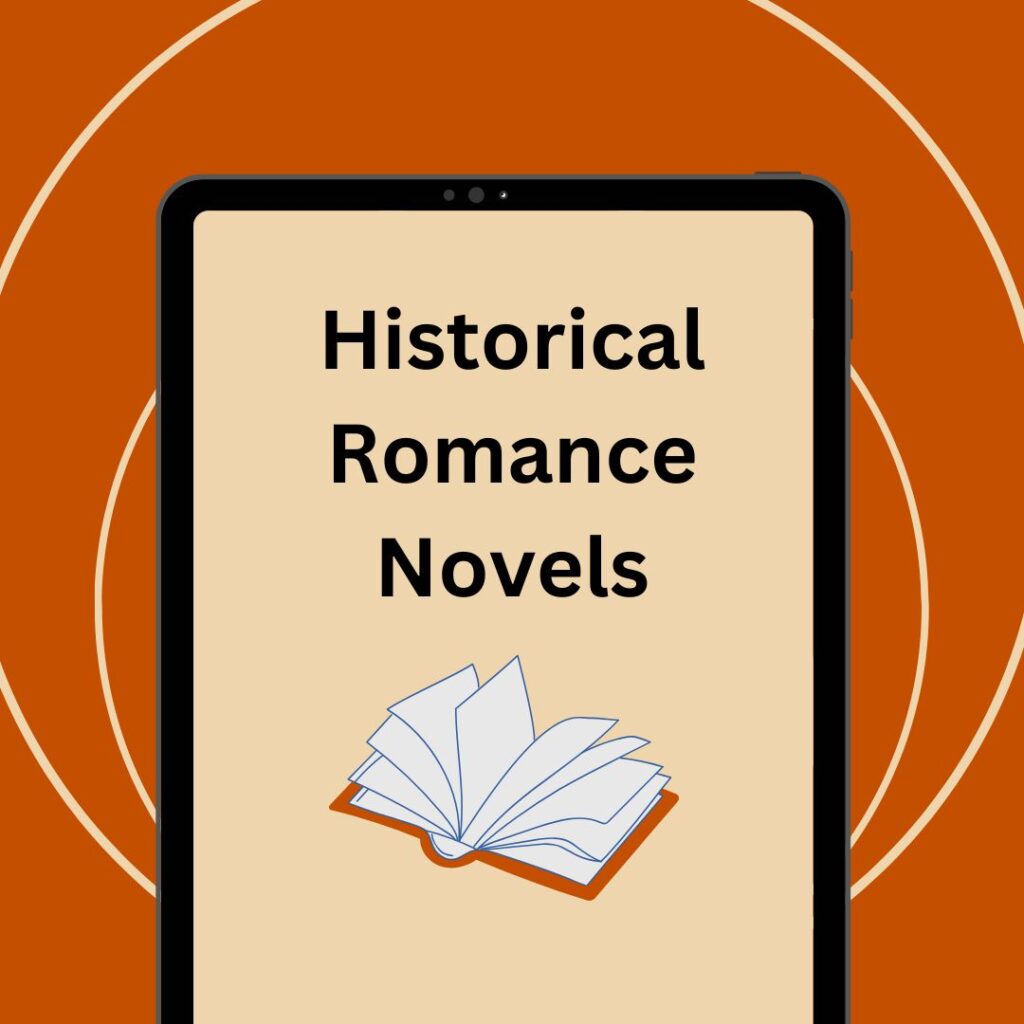Historical Romance Novels

Table of Contents
What Makes Historical Romance Unique?
Historical romance is a subgenre of romance fiction that is set in a specific historical period. It combines elements of romance with historical accuracy, allowing readers to experience love stories that unfold within the context of a well-researched backdrop. Here are some defining characteristics:
- Historical Accuracy: Successful historical romances honor the time period they depict, providing readers with an authentic experience.
- Character-Driven Narratives: The protagonists are often complex characters whose motivations and struggles reflect the societal norms of their time.
- Happy Endings: Like most romance novels, historical romances typically conclude with a “happily ever after” (HEA) or “happily for now” (HFN), fulfilling reader expectations.
- Rich Settings: The settings are meticulously crafted to reflect the historical period, enhancing the romantic journey.
Key Themes in Historical Romance Novels
- Love Against All Odds: Many historical romances feature couples who must overcome societal obstacles, class differences, or familial disapproval to be together.
- Personal Growth: Characters often undergo significant personal development throughout their journeys, learning about love, sacrifice, and resilience.
- Cultural Exploration: These novels provide insights into different cultures and traditions, enriching readers’ understanding of history.
- Adventure and Intrigue: Many historical romances incorporate elements of adventure or mystery, adding excitement to the romantic plot.
The Best Historical Romance Novels
1. Outlander by Diana Gabaldon
Outlander follows Claire Randall, a World War II nurse who is mysteriously transported back to 18th-century Scotland. There, she encounters Jamie Fraser, a dashing Highland warrior.
Key Themes
- Time Travel: The unique premise allows for exploration of two distinct eras.
- Forbidden Love: Claire’s struggle between her modern life and her feelings for Jamie creates tension.
- Historical Richness: Gabaldon’s meticulous research brings 18th-century Scotland to life.
This epic saga has captivated millions with its blend of romance, adventure, and historical detail.
2. The Duke and I by Julia Quinn
The first book in the beloved Bridgerton series introduces Daphne Bridgerton and Simon Basset, the Duke of Hastings. Their initial arrangement to feign a courtship leads to unexpected feelings.
Key Themes
- Social Expectations: The novel explores the pressures of Regency-era society on relationships.
- Character Development: Both protagonists evolve as they confront their pasts and desires.
- Witty Banter: Quinn’s humor adds charm to the romantic tension.
This novel set off a cultural phenomenon with its recent adaptation into a hit Netflix series.
3. Devil in Winter by Lisa Kleypas
In this third installment of the Wallflowers series, shy heiress Evangeline Jenner must marry to escape her family’s grasp. She turns to the notorious Sebastian St. Vincent for help.
Key Themes
- Redemption Arc: Sebastian’s transformation from rogue to devoted partner is compelling.
- Strong Female Protagonist: Evangeline’s journey toward self-discovery is inspiring.
- Emotional Depth: The characters’ vulnerabilities make their love story relatable.
Kleypas masterfully blends passion with emotional resonance in this unforgettable tale.
4. A Knight in Shining Armor by Jude Deveraux
This enchanting novel follows Dougless Montgomery as she accidentally travels back in time to meet Nicholas Stafford, a 16th-century knight.
Key Themes
- Time Travel Romance: The juxtaposition of modern sensibilities with medieval customs adds depth.
- Adventure and Intrigue: Dougless must navigate court politics while trying to return home.
- True Love’s Sacrifice: The story explores what it means to truly love someone across time.
Deveraux’s storytelling captivates readers with its blend of humor and heartfelt moments.
5. The Bronze Horseman by Paullina Simons
Set against the backdrop of World War II in Leningrad, this sweeping saga follows Tatiana Metanova and her passionate love for Alexander Belov amidst war’s chaos.
Key Themes
- Survival and Sacrifice: The characters face unimaginable hardships during wartime.
- Epic Love Story: Their relationship is tested by external circumstances and personal choices.
- Historical Context: Simons vividly portrays life during one of history’s darkest periods.
This novel is both a poignant love story and an exploration of resilience in adversity.
6. The Secret Garden by Frances Hodgson Burnett
Though often classified as children’s literature, The Secret Garden contains rich themes suitable for all ages. It tells the story of Mary Lennox discovering a hidden garden that transforms her life.
Key Themes
- Healing Power of Nature: The garden serves as a metaphor for personal growth and healing.
- Friendship and Love: Mary’s relationships evolve as she learns about compassion and connection.
- Transformation: Characters undergo significant changes through their experiences in the garden.
Burnett’s classic remains timeless for its exploration of love and renewal.
7. Gone with the Wind by Margaret Mitchell
Set during the American Civil War, Gone with the Wind follows Scarlett O’Hara as she navigates love and loss amidst turbulent times.
Key Themes
- Strong Female Lead: Scarlett’s determination and resilience make her an unforgettable character.
- Historical Context: The novel provides insight into Southern society during a pivotal era.
- Complex Relationships: Scarlett’s tumultuous love life adds depth to her character arc.
Mitchell’s sweeping narrative has left an indelible mark on American literature.
8. The Nightingale by Kristin Hannah
Set during World War II in France, The Nightingale tells the story of two sisters navigating love, loss, and survival during Nazi occupation.
Key Themes
- Sisterhood: The bond between Vianne and Isabelle drives much of the emotional weight.
- Courage in Crisis: Both women demonstrate incredible bravery in their fight against oppression.
- Historical Accuracy: Hannah meticulously researched wartime France, adding authenticity to the narrative.
This poignant tale showcases the strength of women during one of history’s darkest chapters.
9. Pride and Prejudice by Jane Austen
Austen’s classic novel centers around Elizabeth Bennet and Mr. Darcy’s evolving relationship amidst societal pressures in early 19th-century England.
Key Themes
- Class Differences: The story critiques social hierarchies while exploring themes of pride and prejudice.
- Wit and Humor: Austen’s sharp dialogue adds levity to serious themes.
- Character Growth: Both Elizabeth and Darcy undergo significant transformations throughout their journey together.
This timeless tale continues to resonate with readers across generations due to its rich characterizations and social commentary.
10. An Heiress’s Guide to Deception and Desire by Manda Collins
In this Regency-era romance, Lady Amelia Stalworthy teams up with an unlikely ally to uncover secrets that could change everything she knows about herself—and her family.
Key Themes
- Mystery Elements: Intrigue adds depth to the romantic plotline.
- Empowered Women: Amelia takes charge of her destiny while navigating societal expectations.
- Romantic Tension: The chemistry between Amelia and her partner heightens suspense throughout the narrative.
Collins delivers an engaging mix of romance and mystery that keeps readers on their toes.
Frequently Asked Questions (FAQs) About Historical Romance Novels
1. What is a historical romance novel?
A historical romance novel is a story set in the past, typically before the 1940s, that centers around a romantic relationship between two characters. The plot often reflects the social norms, customs, and technology of the time period, culminating in a “happily ever after” (HEA) ending.
2. How do historical romance novels differ from historical fiction?
While both genres are set in historical contexts, the primary distinction lies in their focus. Historical romance centers on the romantic relationship as the main plot, whereas historical fiction may include romance but focuses more on broader historical events and character development without a guaranteed happy ending.
3. What are some common themes in historical romance novels?
Common themes include:
- Love Against Societal Norms: Characters often face obstacles such as class differences or family disapproval.
- Personal Growth: Protagonists frequently undergo significant development as they navigate their relationships.
- Cultural Exploration: These novels provide insights into different cultures and historical periods.
- Adventure and Intrigue: Many stories incorporate elements of mystery or adventure alongside romance.
4. Are there specific time periods that are popular in historical romance?
Yes, popular time periods include:
- Regency Era: Often associated with authors like Jane Austen and Julia Quinn, this period features ballrooms and societal expectations.
- Victorian Era: Known for its strict social codes and class distinctions.
- Medieval Times: Featuring knights, castles, and epic quests.
- American Civil War: Exploring themes of love amidst conflict.
5. Who are some well-known authors in the historical romance genre?
Some prominent authors include:
- Lisa Kleypas: Known for her Wallflowers and Ravenels series.
- Julia Quinn: Famous for the Bridgerton series.
- Diana Gabaldon: Best known for Outlander.
- Georgette Heyer: Often credited with popularizing the Regency romance.
6. What should I look for when choosing a historical romance novel?
When selecting a historical romance novel, consider:
- Author Reputation: Look for authors known for their engaging storytelling and well-researched settings.
- Time Period: Choose a time period that interests you.
- Character Development: Look for novels with relatable characters and emotional depth.
- Reader Reviews: Check reviews to gauge other readers’ experiences with the book.
7. Can I find diversity in historical romance novels?
Yes! Many contemporary authors explore diverse perspectives within historical settings. For instance, Beverly Jenkins writes about African-American experiences in post-Civil War America, while other authors may focus on different cultures or lesser-known historical events.
8. Are all historical romances predictable?
While many historical romances follow familiar tropes—such as enemies-to-lovers or arranged marriages—skilled authors often add unique twists and character depth to keep readers engaged. The predictability can be comforting for fans of the genre who appreciate classic romantic arcs.
9. How important is historical accuracy in these novels?
Historical accuracy enhances the reading experience by providing context and depth to the story. However, some authors may take creative liberties for narrative purposes. Readers often appreciate when authors balance authenticity with engaging storytelling.
10. Are there any popular subgenres within historical romance?
Yes! Some popular subgenres include:
- Highland Romance: Set in Scotland featuring clans and warriors.
- Regency Romance: Focused on British society during the Regency era.
- Historical Spy Romance: Combining elements of espionage with romantic plots.
- Western Historical Romance: Set in the American West, often featuring cowboys and frontier life.
11. Do historical romance novels always have a happy ending?
Most historical romances conclude with a “happily ever after” (HEA) or “happily for now” (HFN) ending, fulfilling reader expectations for romantic satisfaction. However, some may explore more complex or bittersweet conclusions while still focusing on love.
12. Can I read historical romance novels if I’m not familiar with history?
Absolutely! While knowledge of history can enhance your understanding of the context, many authors provide enough background information to make their stories accessible to all readers. The emotional journeys of the characters often resonate regardless of your familiarity with specific events or eras.
Conclusion
Historical romance novels offer readers an enchanting escape into different eras while exploring timeless themes such as love, sacrifice, and personal growth. From classics like Pride and Prejudice to contemporary hits like Outlander, these stories captivate audiences with their rich settings, complex characters, and compelling narratives. Whether you’re seeking adventure or emotional depth, this genre promises something for everyone who dares to turn its pages. Dive into these remarkable tales today—your next great love story awaits!
Discover marketing services, interviews & publishing tools at SharingStories.


